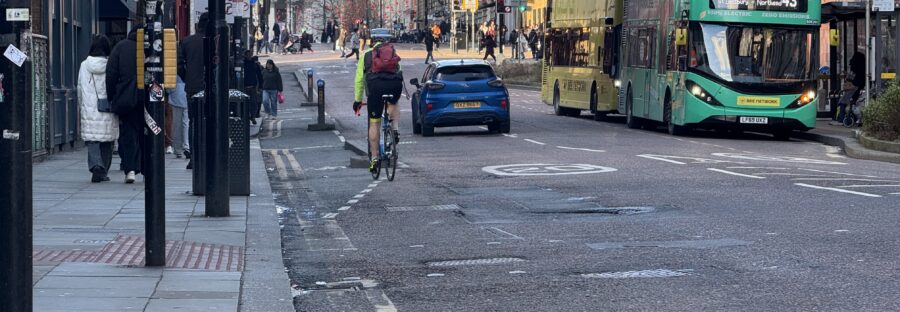Greater Manchester’s Clean Air Plan needs ‘more ambition’
- Campaigners say Clean Air Plan does not go far enough to meet WHO guidelines
- City Council say move will ‘improve health and support economic growth’
- Featured image credit: Edward Firman
Manchester’s alternative Clean Air Plan ‘does not go far enough’ campaigners have said, after the government backed the controversial scheme.
The government announced on Thursday its support for Andy Burnham’s £86 million investment into low-emission buses and taxis as an alternative to charging motorists for driving in clean air zones.
The decision finally brings a close to a 3-year battle, after the original clean air zone plan to charge motorists up to £60 were put on hold in 2022 following a huge public backlash.
However, Regional Clean Air Lead at Asthma + Lung UK Maddy Dawe has called for ‘more ambition’, with Greater Manchester sitting at the highest level of air pollution in the UK.
“Whilst we welcome the measures outlined in the plan, they are only designed to cut air pollution levels to just below legal limits, far above the internationally recognised guidelines set by the World Health Organization (WHO).
“Without striving to meet WHO guidelines, Greater Manchester will not achieve the rapid reduction in air pollution necessary to safeguard people’s health, particularly those with lung conditions.”
Latest figures from the Government show nitrogen dioxide (NO2) levels have risen in Manchester in the last two years, sitting at 55 micrograms per cubic metre – well above the UK’s 40 microgram legal limit.
WHO guidelines currently set a lower limit of 10, a target Greater Manchester agreed to when it signed up as a BreatheLife city-region in 2017.
The Government set out air quality targets in 2010, but Greater Manchester’s councils did not take action until 2017. They were initially told that air quality must be legally compliant by 2024, but this was later pushed back two years following a row.
Liz Godfrey, Manchester co-ordinator for Mums for Lungs, said: “We’ve just got this generation of children now who’ve grown up breathing dirty air. You know, my daughter was born in 2017 when we were supposed to have done something about this. So, she has been breathing toxic air since then and it’s just doing untold damage.
“[I’m] very disappointed with the decision. Overall, I think it lacks ambition. I think we shouldn’t just be aiming to try and scrape under the UK legal levels. We should be aiming for the World Health Organisation’s guideline levels if we actually want to tackle people’s health, especially children’s health in Greater Manchester.”
She pointed out Amsterdam’s recent implementation of a zero-emission zone in the city centre.
“It’s not a job done, is it? It’s a starting point, and we’ve been playing catch up for years with this.
“It is happening in other big city centres, and I guess the whole point is if we’re supposed to have this fantastic public transport system, the one place it would work is the city centre because people can actually get into it, can’t they?”
£51.1m of the funding will be going towards 40 zero-emission buses and 77 Euro VI standard buses, but Liz issued concerns, calling it ‘ridiculous’: “Other cities have been phasing out the Euro 6 diesel buses for years now. You know, Sadiq Khan said in 2017 he wanted to start aiming to phase those out, and yet we’re buying more in.”
However, the Clean Air Fund welcomed the news in a post on X, expressing interest in helping Manchester Council to ‘improve health, reduce inequalities & support economic growth’.
Councillor Bev Craig, Leader of Manchester City Council, also welcomed the announcement, saying: “After years of delay and dithering under the previous Government, it’s great that we finally have clarity and certainty about how clean air will be achieved in Manchester and the rest of Greater Manchester – and that they have agreed with our case that it can – and will – be achieved without the need for charging.
“Clean air is an environmental priority and pollution has damaging impacts on the health of residents in the most affected areas. It’s important that we get on with addressing it and that’s exactly what today’s announcement will allow us to do.”
Andy Burnham, Mayor of Greater Manchester, expressed gratitude at the news: “We are grateful to this Government for listening to Greater Manchester and for this vote of confidence in our investment-led approach to cleaning up our air. This is the right decision for Greater Manchester and it gives people here the certainty they have long needed.”
Emma Hardy, Air Quality Minister, said: “To improve our health, wellbeing and the environment, we must improve air quality. Local authorities know their communities well and so they need to develop plans that are most effective for their local area, and I am pleased that Greater Manchester has found a clear way to reduce emissions without the need to charge motorists.”


